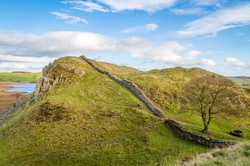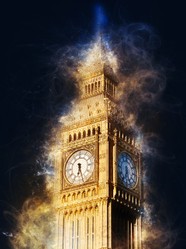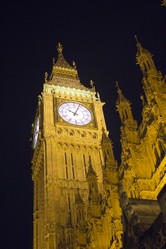Identity differences are often fossilized by the legacy of ancient grievances, as people nurture historical memories of past hurts and lay blame on their enemies, thinking themselves the wronged goodies. Let's be clear, in the bloodstained history of England and Scotland there have been few, if any goodies. Both sides have invaded each other's countries, massacred each other's armies, slaughtered, plundered, tortured and enslaved. Both nations are as guilty as hell! And I make no excuses for my fellow English.
The misbehaviour of the English in Scotland is a matter of historical record. The Plantagenet king Edward the First, vicious thug, did much to harm Scots, and his atrocities in Berwick upon Tweed would now have been war crimes. His brutal treatment of the Scottish hero, Wallace, was an atrocity.
Henry the Eighth also committed atrocities in Southern Scotland. What is known as the Rough Wooing, when Henry tried to force the Scottish king to wed his daughter Mary, later to be queen of Scots, to his son Edward was the source of much violence and injustice. Henry also launched an unprovoked invasion of Scotland that resulted in the English victory of Solway Moss, though the result was politically indecisive. It is worth saying that Henry killed more of his own English people than he did Scots.
Yet before we start playing goodies and baddles we must recall that during the Norman period there were major Scottish raids on England in which thousands of Northern English were either massacred, robbed or taken as slaves. In 1069 the population of Durham was cowering in Durham Cathedral from an attacking Scottish horde until the Normans arrived to defeat them.
In the time of the Baronial Wars the Scottish king David, who held earldoms in Northern England tried to unite them into Scotland by invading, taking advantage of England's civil war, only to be defeated at the battle of Northallerton [1138] after which the Scots were harried back to the border by vengeful English.
Scots were not subjects of the British empire. As much as the English they profited from it. Both English and Scots managed colonies and exploited the economic opportunities that empire brings. Both filled the ranks of the force of empire. Both Scots and English profited from the slave trade.
Much injustice in Scotland was done in the Highland Clearances, in which Scots were unjustly driven from their lands, often into emigration to make way for sheep. But it was Scottish landlords who were meeting demand for wool from English merchants, so there were morally guilty people in both countries, and this is more of a class than a nationality issue.The clan wars that beset Scotland were Scots fighting Scots, and the English had little to do with them.
It would be a good idea if some people who nurture historical grievances about each other's country grew up and realized that historic animosities must be put behind us. Our national identities are born of bloodshed, but bloodshed should not have the last word on them. We need to move on into a peaceful, shared tomorrow.







 Pilgrimage. A review25 days ago
Pilgrimage. A review25 days ago
 Leo the Fourteenthon 05/09/2025
Leo the Fourteenthon 05/09/2025
 The Melsonby Hoardon 03/25/2025
The Melsonby Hoardon 03/25/2025




Comments
Shakespeare used some names for known historical characters, but he did invent names when required, e.g. Falstaff.
Thank you for your comment below, on Mar 22, 2023, in answer to my previous, same-day observation and question.
Online sources are not forthcoming about any etymology beyond the Shakespearean play.
Is William Shakespeare known for inventing names?
I know of no etymology for Fleance.
This question is somewhat related because it regards Scotland, somewhat unrelated since it regards Wales.
The play Macbeth makes Fleance move all the way to Wales, where he ultimately prompts the Stuart royal line. Online sources mention this as unlikely because, among other arguments, they offer Fleance as a plot-advancing figment of the Shakespearean imagination.
The above-mentioned Fleance seems to be the only non-person -- ;-D -- or person with that name. One online contributor to a names-meaning forum stated that the name means someone who is mangy with fleas!
Would there be any information on your, eastern (Atlantic) pond side as to the origins and meaning of Fleance?
I am not totally opposed to the Barnett formula, as it takes into account the fact that Scotland is poorer than England is and also the difficulty that, as Scotland is a country where population outside the main urban centres is widely spread, services are more costly per head to deliver. Furthermore, the rule that letters of a given size always cost the same anywhere in the UK benefits remote areas, as a free market approach would make them pay more for their delivery. But I am content with the present system, as it is a means of subsidizing the extremities of the country, which suffer economic difficulties. However, I note that were Scotland to leave the union, the residual UK would be under no obligation to continue with either Barnett or the universal postal service, so Scotland would lose out.
But like you, Veronica, I object to the injustice that England is the only one of the four nations without its own parliament, and I am incensed that the Scots Nationalists, who are eager for more powers for Scotland, are objecting to the very small reform of English votes for English laws. It is a serious injustice against the English.
Well said, Veronica.
Having had my ethnicity DNA genetics done recently, I learned that there is little to distinguish English, Scottish and Welsh DNA. They are grouped together, so Frank's comments about North West England make sense to me. Irish DNA is distinctive from the other 3 nations. I am mainly Irish by genetics.
Our system in UK is rather unfair I think. English MPs are not allowed to vote on any Scottish issues but the Scots MPs have a right to vote on English issues. Under Barnett Formula funding by the government, the Scots have more paid to them per head for their public services than England and Wales people. For 2012/13 the funding per head for each person in UK to have spent on their public services was,
England £8,529.00
Scotland £10,152.00
Wales £ 9,009.00
Northern Ireland £ 10,876.00
Looking back at recent Prime Ministers, we have, ...
David Cameron whose family are Scots
Gordon Brown who is Scots
Tony Blair who is Scots
The Queen is half Scot
John Smith who was former Labour Party leader was Scots.
Our leaders are Scots and have been for decades. The Scots leaders of England give extra funding to Scotland.
Absolutely right
Interesting. Now that Scotland has voted against independence I believe England still has the same question before i, but for either to go alone would probably be an economic disaster.
Thanks Mira, so do I.